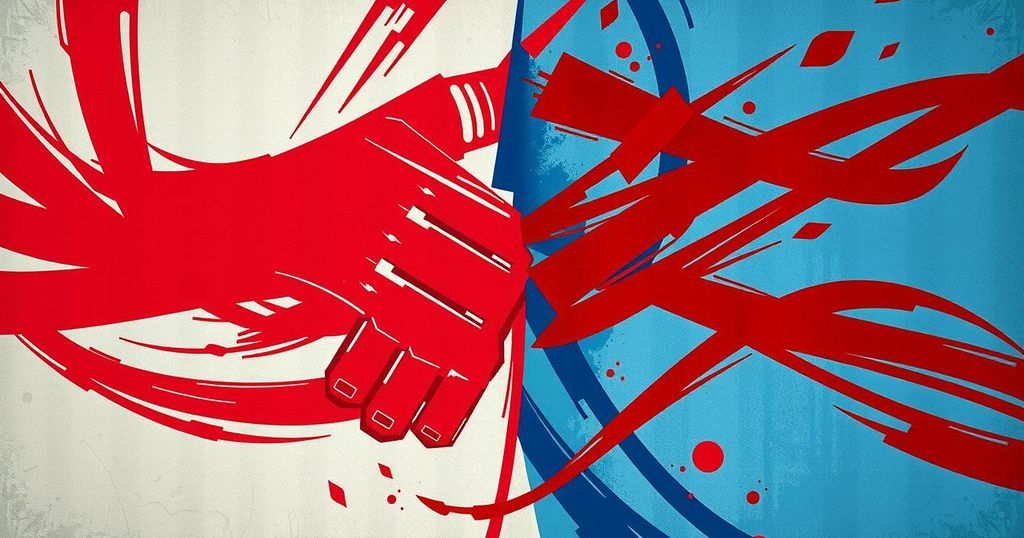Israeli voices are increasingly critical of Qatar for its support of Hamas, focusing on Prime Minister Netanyahu’s past policies that facilitated Hamas’s militarization. Despite years of consensus supporting this approach, dissent now arises from various Israeli quarters. Qatar’s defense claims its actions are internationally sanctioned, but accusations of involvement in global terrorism complicate its narrative. This critique may signal a shift in Israeli governmental policy regarding Qatar’s financial contributions to extremist entities.
Recently, Israeli voices have emerged criticizing Qatar for its support of Hamas, particularly in the context of the ongoing conflicts in Gaza. This wave of dissent is largely directed towards Prime Minister Benjamin Netanyahu, who has previously promoted Qatari involvement, enabling Hamas’s militarization, including extensive tunnel systems and a formidable arsenal. This renewed criticism follows years of political acquiescence among Israeli leaders regarding Qatar’s financial contributions to Hamas.
Traditionally, Israeli political consensus supported Netanyahu’s policy, with former Defense Minister Avigdor Liberman being a notable exception, having resigned in 2018 due to these policies. For years, the Middle East Media Research Institute (MEMRI) has been a lone critic of Qatar’s financial transactions with Hamas, unequivocally warning of impending violence. Academic voices like Dr. Yossi Shain have also denounced Qatar’s ambiguous stance on terrorism.
Ambassador Ron Prosor, an Israeli official, has been among the few to publicly condemn Qatar for its backing of global terror, asserting that the financial support has directly enabled Hamas’s military capabilities. In an op-ed, he noted, “Each of Hamas’s tunnels and rockets might as well have had a sign reading ‘Made possible by a generous donation from the Emir of Qatar.'” Despite prior concerns, the Israeli government remains largely silent, while several ministers have recently begun to publicly challenge the status quo, signaling a possible shift in policy.
The Qatari ruling family has responded to this backlash by framing their support for Hamas as an initiative endorsed by several global leaders, including Israel. They claim this engagement has led to Hamas moderating its stance, a claim contradicted by recent violent escalations. Qatar’s defense seeks to mitigate the risk of its support for terrorist activities being exposed, which could jeopardize the ruling regime’s stability amid international scrutiny.
Moreover, Qatar faces additional challenges from revelations regarding its connections to international terrorism, which implicate the country in serious global incidents. MEMRI’s research has linked Qatar to various heinous acts of terrorism, complicating its defense strategy amidst rising accusations from the West.
Furthermore, Qatar’s existing legal agreements with the United States cannot be viewed as effective shields against these allegations. Critics assert that these arrangements do not satisfactorily protect American rights or security, given Qatar’s historical support of extremist factions. Observations regarding Qatar’s media entities, such as Al-Jazeera failing to comply with legal registrations, further exacerbate the scrutiny it faces in international circles.
Recent discussions and investigations into Qatar’s strategies and affiliations reveal a larger narrative about the impacts of its support for terrorism on its standing in the international community. While the situation continues to unfold, forthcoming reports promise to illuminate further complications for both Qatar and those who have historically backed its policies.
The emerging dissent against Qatar’s support for Hamas has marked a significant shift in Israeli political discourse, primarily targeting Prime Minister Benjamin Netanyahu’s past endorsements. With key figures from various sectors beginning to voice concern, this critique signals a potential policy reevaluation. Qatar’s attempts to justify its role amid rising allegations of terrorism sponsorship highlight its precarious position, as it faces increasing scrutiny both domestically and internationally. Continued examination of these developments implies significant implications for regional stability and international relations.
Original Source: aurora-israel.co.il




